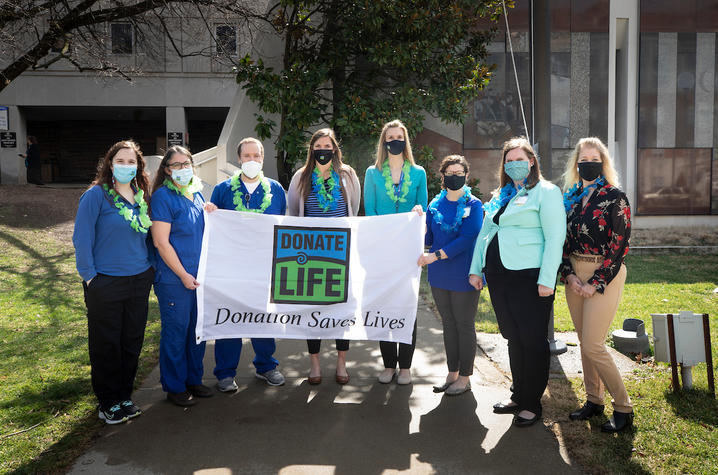Busting Myths About Organ Donation

The University of Kentucky Public Relations & Strategic Communications Office provides a weekly health column available for use and reprint by news media. This week's column is by Dr. Ashley Montgomery-Yates, head of the UK Transplant Center Donation Committee.
LEXINGTON, Ky. (April 5, 2021) — April is Donate Life Month and a celebration of the generous people who gave the gift of life as either a living donor or who opted to be a donor upon their passing.
More than 1,000 Kentuckians are awaiting the gift of a life-saving organ. Organs that can be donated include kidneys, heart, liver, lungs, pancreas and small intestines. Tissue that can be donated includes heart valves, corneas, skin, bone, ligaments, tendons, fascia, veins and nerves. One organ donor can save up to eight lives. One tissue donor can heal more than 75 lives. Anyone can register to be an organ donor, but there are some pervasive myths that dissuade people from joining the registry. Here are some common misconceptions about organ donation.
MYTH: I’m too unhealthy and my organs couldn’t be used.
FACT: People of all ages and medical histories should consider themselves potential donors. Your medical condition at the time of death will determine what organs and tissues can be donated.
MYTH: My religion doesn’t support organ donation.
FACT: All major religions support donation as a final act of compassion and generosity.
MYTH: Doctors won’t try to save you if you’re an organ donor.
FACT: Your life always comes first. Doctors work hard to save every patient’s life, but sometimes there is a complete and irreversible loss of brain function and the patient is declared clinically and legally dead. Only then is donation an option.
MYTH: I registered to be a donor, but my family can override my decision.
FACT: Once a person turns 18, the decision to say “yes” is considered a legal, advanced directive. You should still inform your family of your decision. Upon your death, the recovery organization will inform them of your decision to be a donor and will involve them in the donation process, but will not ask them for authorization.
MYTH: If someone tests positive for COVID-19, they can’t donate.
FACT: Organ procurement organizations test all potential deceased donors for COVID-19 prior to offering the organs for transplant. Potential donors who test positive with active COVID-19 would not be able to donate. If someone recovers from COVID-19, then passes away from something unrelated, donation may be possible.
For more information on organ donation and to register to become an organ donor, visit donatelifeky.org.
As the state’s flagship, land-grant institution, the University of Kentucky exists to advance the Commonwealth. We do that by preparing the next generation of leaders — placing students at the heart of everything we do — and transforming the lives of Kentuckians through education, research and creative work, service and health care. We pride ourselves on being a catalyst for breakthroughs and a force for healing, a place where ingenuity unfolds. It's all made possible by our people — visionaries, disruptors and pioneers — who make up 200 academic programs, a $476.5 million research and development enterprise and a world-class medical center, all on one campus.




